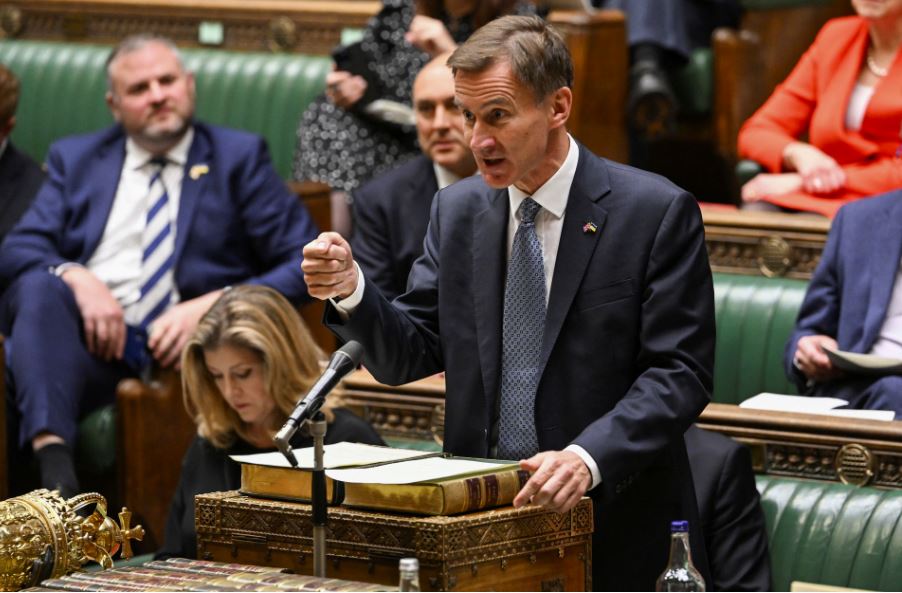Britain Faces Record Hit to Living Standards as Tax Hikes Loom
LAHORE MIRROR (Monitoring Desk)– Britain faces a record hit to living standards this year as surging inflation erodes incomes, the country’s budget forecasters warned, after finance minister Jeremy Hunt announced more pain, with tax rises now and spending cuts further ahead.
In a bid to restore Britain’s fiscal reputation after the chaos caused by former prime minister Liz Truss’s plans for sweeping tax cuts, Hunt outlined a budget programme on Thursday to save 55 billion pounds a year to fix the public finances.
Almost half the belt-tightening is due to come from tax increases, prompting some protests from within Prime Minister Rishi Sunak’s ruling Conservative Party, which faces a national election within two years.
Already struggling to adjust to life outside the European Union, Britain’s economy was suffering from high inflation and a slowing global economy even before Truss sent financial markets into convulsions. It is the only Group of Seven economy yet to recover its pre-COVID size and income growth was near-stagnant for a decade ahead of the pandemic.
The Office for Budget Responsibility said household disposable incomes would fall by 4.3% in the current financial year and by 2.8% in 2023/24, the sharpest declines in records dating back to the 1950s.
That two-year slump would wipe out all the growth in living standards over the eight years to 2022, the OBR said.
Millions of Britons are already grappling with a cost of living crisis. Inflation was 11.1% in October, a 41-year high.
But Hunt said painful fiscal medicine was needed for Britain to maintain the recent return of calm to financial markets, even if most of the belt-tightening is delayed until past 2024, when the next national election is expected.
The OBR said the tax burden was on course to reach 37.1% of GDP in five years’ time, its highest sustained level since World War Two, up from 33.1% in the 2019-20 tax year.
“Credibility cannot be taken for granted and yesterday’s inflation figures show we must continue a relentless fight to bring it down, including an important commitment to rebuild the public finances,” Hunt told parliament.
Hunt said the economy was already in recession and set to shrink next year as it struggles with inflation forecast to average 9.1% this year and 7.4% in 2023 before falling sharply.
Sterling was down 1.1% against the dollar and 0.5% against the euro at 4:40 p.m. (1640 GMT), as investors assessed the scale of retrenchment, which looked more severe than anything planned by other big rich economies.
“The UK remains somewhat of a difficult place to judge right now,” Marcus Brookes, chief investment officer at Quilter Investors, said. “We are not necessarily at the end of the train of bad news and with a prolonged recession priced in we may need to wait for a more sustained downward path of inflation.”
“FURTHER STEP”
Ratings agency Moody’s, which last month warned it could downgrade Britain’s credit rating after Truss’s short but tumultuous spell as prime minister, said Hunt’s plan was a “further step” towards fixing the public finances.
“However, the polarised domestic political environment and heightened policy unpredictability may undermine efforts to deliver on fiscal consolidation,” Moody’s senior credit officer Evan Wohlmann said.
Jacob Rees-Mogg, a leading minister under Truss, said he was “particularly concerned” about the tax rises. Other Conservative Party lawmakers supported the plan.
More people will have to pay basic and higher-rate income tax, and Hunt lowered to 125,000 pounds ($147,000) the threshold at which people pay the top 45% rate. He also cut tax-free allowances for income from dividends.
A threshold at which employers start to pay social security contributions will be frozen until 2028, costing companies more.
A temporary levy on oil and gas companies’ profits will rise to 35% from 25% until 2028, and a similar 45% tax will be imposed on nuclear and wind power electricity producers, raising a combined 15 billion pounds next year.
Public spending would grow more slowly than the economy but rise in overall terms, Hunt said.
A scaled-back version of an existing cap on energy costs would cost nearly 13 billion pounds next year, less than half of what was planned by Truss’s finance minister Kwasi Kwarteng.
But pensions and welfare benefits would go up in line with inflation, a major expense for the public finances.
Paul Johnson of the Institute for Fiscal Studies think tank said the real pain of the tax hikes and spending restraint was only due to come after the likely 2024 election, raising questions about whether it will actually happen.
RECESSION NOW
The fiscal tightening came as the OBR said Britain was already in a recession and it expected the economy to contract by 1.4% next year. In March, it expected growth of 1.8% in 2023.
The OBR forecasts GDP growth of 1.3% in 2024 and 2.6% in 2025.
The opposition Labour Party said the Conservatives had failed to learn the lessons of past attempts to fix the public finances without a clear plan for economic growth.
“This government has forced our economy into a doom-loop where low growth leads to higher taxes, lower investment and squeezed wages with the running down of public services,” Labour’s finance spokeswoman Rachel Reeves said.
Hunt set the government two new fiscal rules including a target of bringing down debt as a share of the economy within five years, a target the OBR said was on track to be met.
SOURCE: REUTERS

